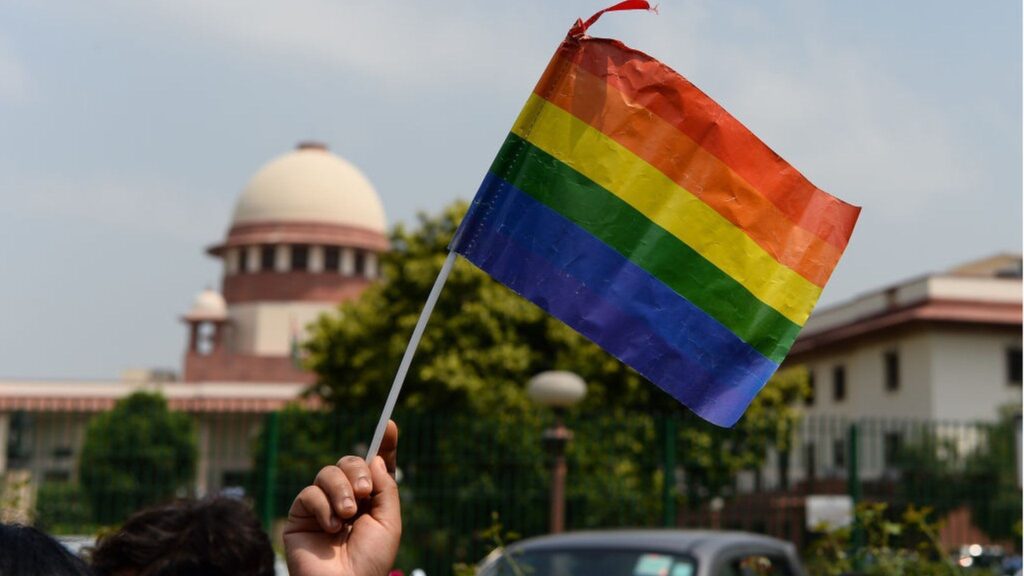Same-Sex Marriage in India: Anticipating a Groundbreaking Verdict by the Supreme Court
In a historic move set to reshape the landscape of personal freedoms in India, the Supreme Court is poised to deliver a landmark ruling on petitions advocating for the legalization of same-sex marriage. This pivotal decision, expected on Tuesday, has stirred nationwide anticipation and ignited fervent debates on constitutional rights, cultural values, and the trajectory of Indian society.
The Petitioners’ Plea: A Quest for Equality
Twenty-one petitions, representing same-sex couples, LGBTQ+ activists, and organizations, collectively argue that the denial of marriage rights amounts to a violation of their constitutional guarantees, relegating them to the status of “second-class citizens.” Their plea extends beyond the quest for legal recognition; it encompasses the fundamental right to marry, a stance firmly rooted in the principles of equality and nondiscrimination.
Challenging Cultural Norms: Opposition from Government and Religious Leaders
In opposition to the push for marriage equality, both the government and religious leaders have taken a strong stance, asserting that same-sex unions run counter to Indian cultural values. Solicitor General Tushar Mehta, representing the government, contends that marriage, in the Indian context, is a sacred union between a man and a woman of heterosexual orientation. This viewpoint is reinforced by leaders across major religions, who argue that marriage is primarily for procreation, not recreation.
Judicial Scrutiny: The Special Marriage Act and Its Implications
The legal battleground centers around the Special Marriage Act (SMA) of 1954, designed to facilitate inter-faith and inter-caste marriages. The petitioners advocate for a subtle but profound modification: replacing “man” and “woman” with the more inclusive term “spouse” within the Act. However, as the hearings unfolded, it became evident that addressing this singular law might prove insufficient, given the myriad laws governing divorce, adoption, succession, and related matters, primarily under religious personal laws.

Crafting a Momentous Judgement: The Court’s Deliberations
The five-judge constitution bench, led by Chief Justice DY Chandrachud, embarked on a journey of “seminal importance.” Their challenge is to navigate the intricacies of Indian society, balancing the demand for LGBTQ+ rights with the deeply rooted traditions centered around marriage and family. The court’s decision is poised to trigger cascading effects, influencing not only same-sex unions but also related legal domains such as adoption, divorce, and inheritance.
Possible Outcomes: Beyond Marriage Equality
While the court’s ruling remains uncertain, speculations point towards the likelihood of certain social and legal rights being granted to same-sex couples, irrespective of the broader decision on marriage equality. Joint bank accounts, insurance policy nominations, and co-ownership of property are among the rights that may be extended. Solicitor General Mehta has expressed the government’s openness to exploring these avenues, indicating a potential middle ground in a contentious legal landscape.
Public Sentiment and Acceptance: A Shifting Paradigm
As the nation awaits the Supreme Court’s decision, it’s essential to acknowledge the evolving attitudes towards LGBTQ+ rights in India. Recent surveys indicate a significant shift, with a Pew survey in 2020 revealing that 53% of Indian adults support legalizing same-sex marriage, a substantial increase from 15% in 2014. Despite this progress, societal attitudes toward sex and sexuality remain conservative, necessitating a delicate balance in the court’s verdict.
The Road Ahead: Nudging Societal Acceptance
Mukul Rohatgi, representing the petitioners, emphasized the role of legal decisions in nudging societal acceptance. In a country where marriage and family are deeply entwined with religious and cultural fabric, the court’s judgment holds the potential to catalyze broader acceptance of the LGBTQ+ community. The ripple effect could extend beyond legal recognition, fostering a more inclusive and understanding society.
Conclusion: A Watershed Moment for LGBTQ+ Rights in India
As the Supreme Court prepares to deliver its historic verdict on same-sex marriage, India stands at the precipice of a societal transformation. The implications reach far beyond the realm of legal recognition, touching upon the very fabric of Indian culture, tradition, and individual freedoms. The court’s decision, whatever it may be, is destined to leave an indelible mark on the trajectory of LGBTQ+ rights in the country.